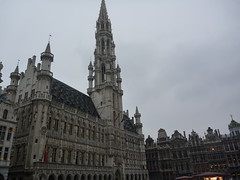 Over the past 10 years, besides regularly visiting friends and family, I have taken countless train rides through and around Belgium. Looking out the window from the quiet and comfortable SNCB trains at the beautiful green fields that stretch as far as the eye can see. Not quite as perfect and manicured as the Netherlands, not quite as spacious as France, no one could argue that in any part of Belgium there is great beauty to be seen and experienced. This beauty extends beyond a nice looking bit of scenery, as this small nation is in many ways the heart of Europe, multicultural and multilingual, having overcome a sad history of wars and conflicts to build a country that at the very least, has achieved a quality of life for the average person that other people throughout the world can only dream of.
Over the past 10 years, besides regularly visiting friends and family, I have taken countless train rides through and around Belgium. Looking out the window from the quiet and comfortable SNCB trains at the beautiful green fields that stretch as far as the eye can see. Not quite as perfect and manicured as the Netherlands, not quite as spacious as France, no one could argue that in any part of Belgium there is great beauty to be seen and experienced. This beauty extends beyond a nice looking bit of scenery, as this small nation is in many ways the heart of Europe, multicultural and multilingual, having overcome a sad history of wars and conflicts to build a country that at the very least, has achieved a quality of life for the average person that other people throughout the world can only dream of.
Problems? Sure they’ve got a fine list of economic, social, and political problems. Some that seem to get worse (like the national debt), some that are just made to sound worse by leaders who benefit from fear, anger, or some other form of rabid regional patriotism.
Even with these problems, the nation is still has a long list of successes and virtues, that would be the envy of pretty much any other continent on the planet. Take any sector, from health to agriculture, to science and beyond, you’ll find plenty of achievements in Belgium.
Despite all this, we still sit ever closer to what seems like the break up of the nation. With every passing election, it feels like a loud majority have forgotten what a great place they live in, and all that they have in common with their neighbors. Instead they believe the solution to all their problems will come with the end of Belgium. Putting an end to one of the most unique and beautiful nations the world has ever known.
 No matter where I look in the service industry, the Netherlands seems to be lacking workers. Yet at the same time, I can think of many university students who would never take such jobs.? I’m also reminded of my fellow university graduates who are seeking work in the field of their studies and would not take up work in a restaurant or a grocery store.
No matter where I look in the service industry, the Netherlands seems to be lacking workers. Yet at the same time, I can think of many university students who would never take such jobs.? I’m also reminded of my fellow university graduates who are seeking work in the field of their studies and would not take up work in a restaurant or a grocery store.